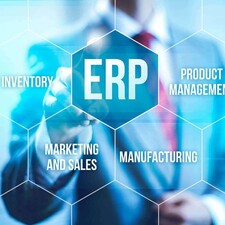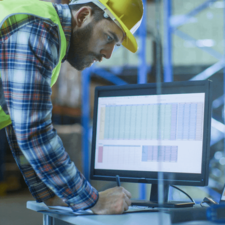Blog
ERP and Blockchain Technology in Manufacturing

Summary
When technology improves, there are new opportunities for manufacturers. Integrating blockchain technology with ERP in manufacturing is a seamless way to improve your business by expediting processes, increasing security, managing relationships, and gaining valuable insights in real time.
What Is Blockchain?
Blockchain is a collection (chain) of computers working on a single project. It automatically tracks, trades, and processes data through various servers. For businesses, blockchain technology is used to record and track assets throughout the supply chain. An asset could be anything physical or digital that crosses your operation — data, products, inventory, warehouse space, or intellectual property.
Improve Automation
Blockchain is a proven method in improving automation. Different parts of your digital footprint can be optimized by implementing blockchain technology. What parts of your operation can be automated? Blockchain helps with processes like:
- Service agreements
- Payment processing
- Invoicing
- Scheduling maintenance
- Tracking and reporting delays
- Inventory monitoring
- Supply chain progression
- Communicating with partners and customers
This is just the tip of the iceberg. Internal data can be automatically parsed, sorted, and compiled in ERP, and securely distributed using blockchain technology.
Help with Security
Securely sharing data within your operation and externally has always been a problem. Cyber attackers are always on the prowl, looking for a way to exploit your business. By integrating blockchain, you can securely distribute information with a higher level of accountability and lower risk of a hack.
Monitor Supply Chain
Supply chain management is an ongoing concern for most manufacturers. With blockchain technology, you can monitor the progress of assets moving through supply chains, with transparency and accountability. Doing this will help limit the number of issues you may encounter during normal operations. If there’s a potential problem in the supply chain, you’ll find out sooner so you can react more quickly.
Support Quality Checks
There are a few ways that your quality can improve thanks to blockchain technology. If you have measurable metrics for your product inputs, then relevant data can be generated and compiled quickly with blockchain. The data will move alongside the materials by using tracking data. This ensures you can track the source of defects, track completed products during shipping, and improve the overall quality of your products.
Manage Your Partners and Suppliers
Blockchain also helps with managing your working relationships with partners and suppliers. You can use the increased visibility and accountability in evaluating new suppliers, improving your due diligence. Shipping delays from partners and suppliers are flagged sooner so you can remedy the situation. For larger operations and complex supply chains, supply chain management can be optimized.
Expedite the Process
The level of automation and insight that comes with integrated ERP and blockchain technology will help you to expedite the entire manufacturing process with enhanced levels of accountability and security. Pinpoint and mitigate problems more quickly and speed up your supply chain times.
Looking for new a ERP system? Download the guide: Selecting an ERP System in 7 Easy Steps
Conclusion
Blockchain technology in manufacturing is a promising concept that’s gaining increased attention and adoption. Key takeaway is that blockchain can add a layer of reporting and accountability in the manufacturing supply chain that may streamline logistics for manufacturers large or small.


